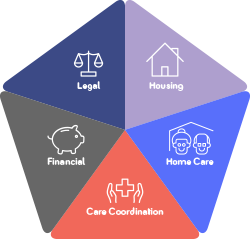
Housing and transition can be a big hurdle in your senior years. Here, LTLA has everything you need to know concerning moving and relocation for seniors, including when you should start planning, how you should prepare and where you should go.
When is it time to make the big move?
Sooner or later it may happen: your aging parents show signs of not being able to care for themselves or a much-loved home. Or, they (or you and your spouse) may be in relatively good health but simply want to put your time, energy and income to other uses, such as travel or hobbies.
With 32 percent of pre-retirees and retirees concerned about their ability to pay their mortgage or rent, moving to a less-expensive area is increasingly becoming an attractive option.
However, knowing when it’s time to scale back on housing expenses or giving up home ownership can be difficult to do, especially if our loved ones don’t feel ready to give up beloved possessions or a house filled with familiar memories. Here are some important considerations for smoothing the process of moving and relocation for seniors.
1. You or your parents have decided to move – it’s time to get to work with a Senior Real Estate Specialist!
What’s the difference between a traditional agent and a Senior Real Estate Specialist? An SRES is a professional designation from the National Association of Realtors. An SRES understands the need for providing emotional support and financial guidance for late-life relocation and moving. An experienced SRES can take a lot of the guesswork and worry out of making decisions for elders. A Senior Real Estate Specialist is available through the Long-Term Living Association (LTLA) to help seniors in the process of relocating with the following considerations:
- Location: should the seniors stay in the same general neighborhood close to friends and established activities, relocate out of the area, or move out of state, perhaps closer to family members?
- Price range: affordability, pricing and selling an existing property and how to accurately determine its value and potential sales price?
- Are there special needs to be considered, such as workshops or hobby spaces, an office, handicapped modifications or other features desired in the new residence?
Factors to consider when dealing with senior real estate concerns:
- The type of housing desired – whether to move to a smaller, more easily-maintainable house (downsizing) such as moving from a large two-story home into a one-level ranch, or into an apartment or condo.
- Is there is a need for assisted living features? This may include homemaking and meal preparation, while still retaining a degree of personal independence.
- Does the senior need more medical and personalized assistance? Are there medical treatments or medication dispensing involved? This may indicate a need for a residence providing nursing and medical services.
Some of the advantages of using an SRES include:
- Helping you determine if there is enough equity in your home to pay for long term care or assisted-living needs in the future.
- Guidance with finding programs to help you with financial assistance in moving.
- Assistance with other professionals to help you sell your home to get the best possible price.
- Unlike most traditional real estate agents, who are usually just looking for a fast sale, a SRES is focused on the needs of the over-60 population real estate issues.
Call the LTLA at 1-800-868-1193 or visit the website longtermliving.org for more information and resources.
 2. Start preparing as soon as possible: working with a Senior Move Manager
2. Start preparing as soon as possible: working with a Senior Move Manager
Using our trusted Senior Move Manager’s guidance, can prevent mistakes and miscalculations when disposing of household goods and line up reliable, affordable moving companies.
- A Senior Move Manager can help with the logistics of packing, hiring a moving company and helping sell the current home by decluttering if necessary. They also assist in showing it off in the best light for potential buyers, along with other marketing strategies.
- They can help organize, coordinate and execute the whole move. This involves everything from meeting with movers to packing and moving precious possessions to setting up in the new home.
- The Long-Term Living Association (LTLA) recommends beginning the process of moving at least as far as three months before the intended move.
- If you plan to take some of your present furnishings with you, be sure to measure everything (including your new floor plan) to ensure that there are no surprises when trying to fit furnishings into the new environment.
- One of the hardest parts of moving is having to part with mementos and other family treasures acquired over the years. Our relocation personnel recommend that you take pictures of items that can’t be kept and add these to a scrapbook of memories.
- Donating usable items to charities or having a yard sale are good ways to dispose of unneeded household goods or furniture. Another option is to hold an estate sale or perhaps an online auction.
Call the LTLA at 1-800-868-1193 or visit their website longtermliving.org for more information.
3. When considering assisted living, work with a Certified Senior Advisor
Here are some signs that may indicate your loved one needs more help and is not thriving in their own space:
- Your parent needs help with meal preparation
- Forgetting to take necessary medications
- Unable to keep up with normal housework or yard care
- Needs help with bathing, dressing and daily hygiene and personal care
An experienced Certified Senior Advisor from the Long Term Living Association will focus on the unique needs of senior parents, especially those who may be undecided about their options. They can also allow your loved ones the flexibility and peace of mind to adapt as circumstances may change in the future.
Advantages of assisted living facilities:
- Your parents or other loved ones are safe and well-cared for by dedicated professionals, with access to proper medical supervision and care as needed
- Medications are administered by a nurse or trained medical technician
- There is a mix of social and other planned activities available, under the supervision of a trained activity director, with the goal of keeping them mentally stimulated as well as engaged in those around them
- The facility building itself is regularly inspected and maintained by personnel onsite, as well as being equipped with security cameras to monitor activities
- Facilities providing memory care closely supervise and monitor residents to prevent them from wandering away from the site
- Your time with your parents is spent enjoying quality interactions, with freedom from the responsibilities of caregiving tasks necessary to keep them safe and healthy — giving invaluable peace of mind to all concerned
When considering a facility, avoid these common mistakes:
- Don’t choose a facility based on your own preferences; your loved ones will be calling it home, so their wishes and needs should come first. Ask their opinions when they accompany you for a visit
- Failing to perform “due diligence” – that is, research, into what each facility offers before signing up. For example, some may not include transportation to activities, or charge extra for doing so. Do the residents appear happy and cared-for?
- Making a hasty decision leaves you unable to take the time to carefully check out each possible facility, and risk choosing the wrong facility
- Finally, not using the services of a trained, certified professional current on the latest care industry updates can cost everyone time and money in the long run
The Long Term Living Association offers the services Certified Senior Advisors to help families avoid these mistakes and guide you in making the best housing and transition choices. Visit their website for further information or call 1-800-868-1193 today.
Experts Across the Aging Spectrum



